Workplace Ethical Dilemma Analysis: MBA8000 Assignment 1 Report
VerifiedAdded on 2021/04/21
|10
|2698
|34
Report
AI Summary
This report presents an analysis of an ethical dilemma encountered in a workplace setting, specifically addressing a case of potential sexual harassment. The author, a witness to the incident, explores the dilemma of whether to intervene publicly or remain silent. The report delves into the application of two prominent ethical theories: consequentialism, focusing on utilitarianism, and non-consequentialism, emphasizing deontological ethics. The utilitarianism perspective supports the author's decision to avoid a public confrontation, prioritizing the maximization of overall happiness and minimizing negative consequences. Conversely, the deontological perspective critiques the author's inaction, highlighting the importance of adhering to moral duties and confronting unethical behavior. The reflection section discusses the contrasting viewpoints offered by the theories and the author's personal stance on the matter, ultimately reaffirming their original decision-making process, prioritizing the happiness of the majority.
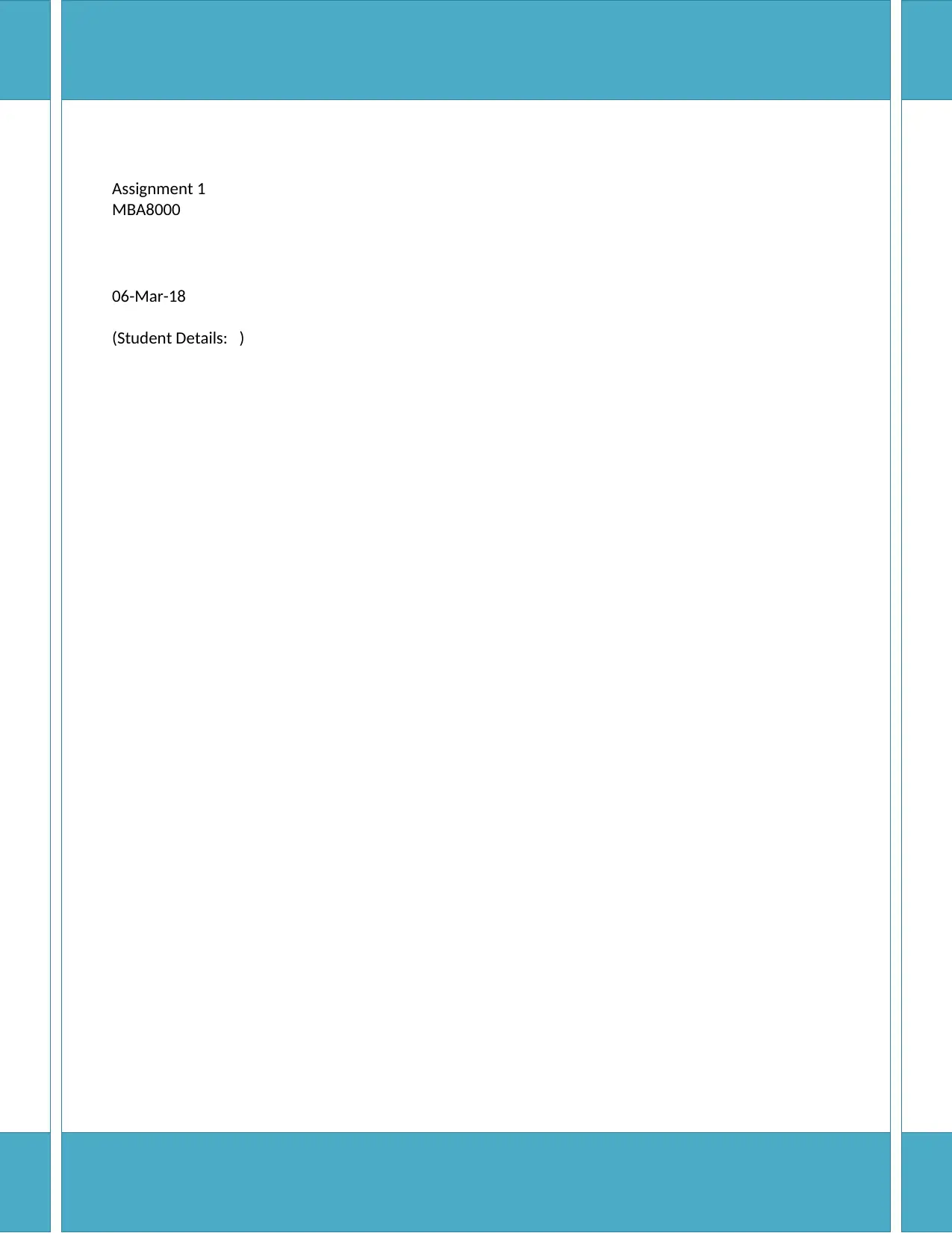
Assignment 1
MBA8000
06-Mar-18
(Student Details: )
MBA8000
06-Mar-18
(Student Details: )
Paraphrase This Document
Need a fresh take? Get an instant paraphrase of this document with our AI Paraphraser
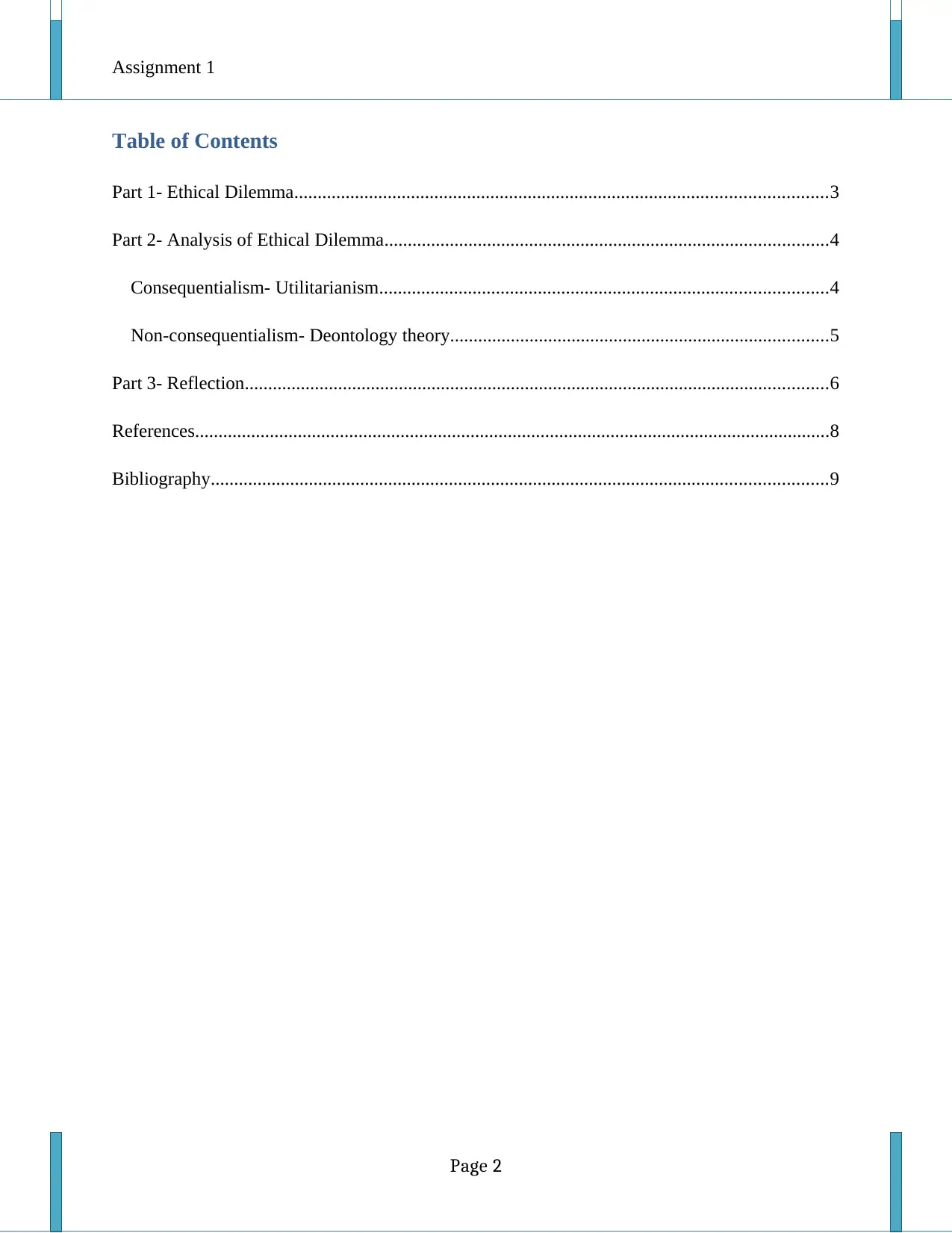
Assignment 1
Table of Contents
Part 1- Ethical Dilemma..................................................................................................................3
Part 2- Analysis of Ethical Dilemma...............................................................................................4
Consequentialism- Utilitarianism................................................................................................4
Non-consequentialism- Deontology theory.................................................................................5
Part 3- Reflection.............................................................................................................................6
References........................................................................................................................................8
Bibliography....................................................................................................................................9
Page 2
Table of Contents
Part 1- Ethical Dilemma..................................................................................................................3
Part 2- Analysis of Ethical Dilemma...............................................................................................4
Consequentialism- Utilitarianism................................................................................................4
Non-consequentialism- Deontology theory.................................................................................5
Part 3- Reflection.............................................................................................................................6
References........................................................................................................................................8
Bibliography....................................................................................................................................9
Page 2
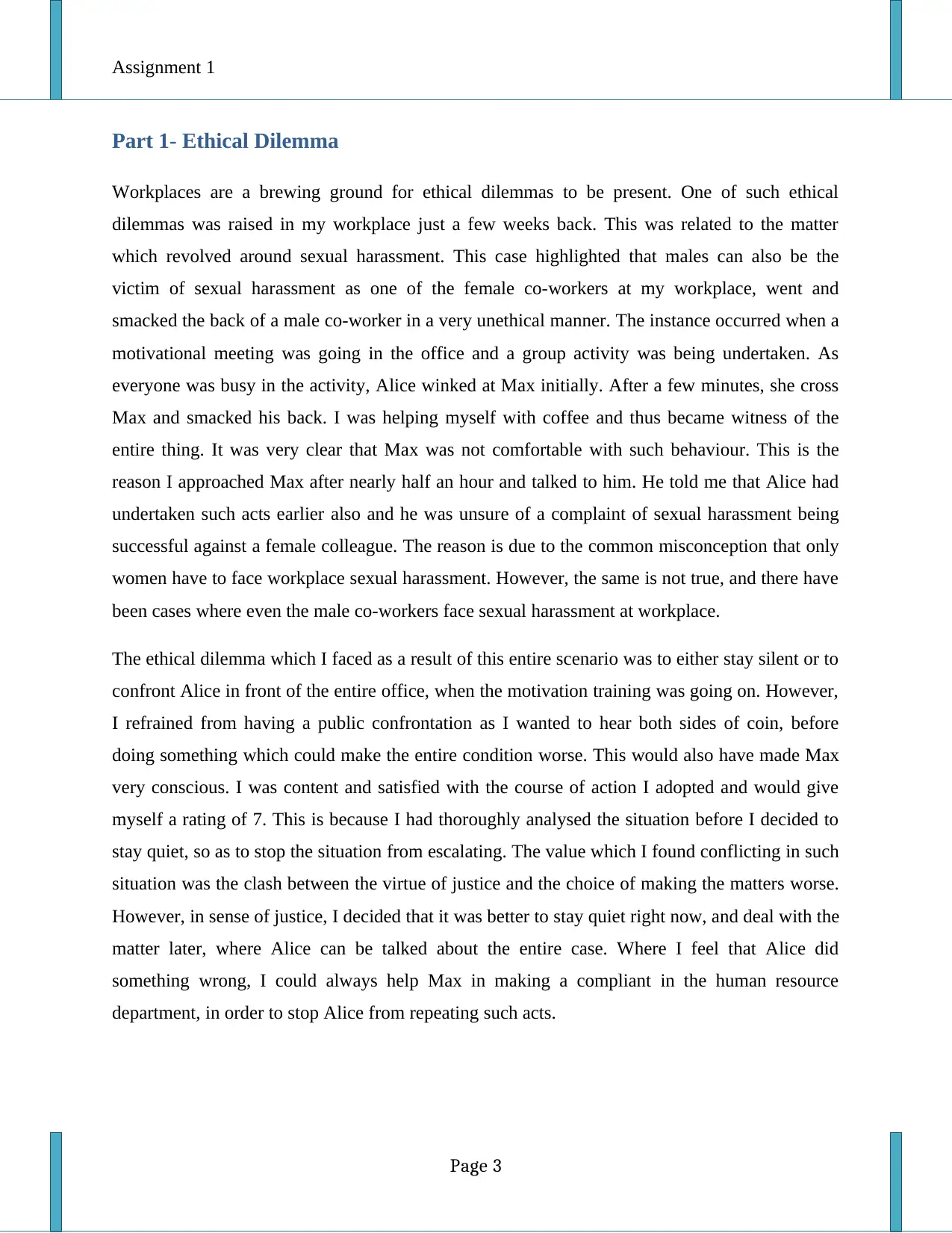
Assignment 1
Part 1- Ethical Dilemma
Workplaces are a brewing ground for ethical dilemmas to be present. One of such ethical
dilemmas was raised in my workplace just a few weeks back. This was related to the matter
which revolved around sexual harassment. This case highlighted that males can also be the
victim of sexual harassment as one of the female co-workers at my workplace, went and
smacked the back of a male co-worker in a very unethical manner. The instance occurred when a
motivational meeting was going in the office and a group activity was being undertaken. As
everyone was busy in the activity, Alice winked at Max initially. After a few minutes, she cross
Max and smacked his back. I was helping myself with coffee and thus became witness of the
entire thing. It was very clear that Max was not comfortable with such behaviour. This is the
reason I approached Max after nearly half an hour and talked to him. He told me that Alice had
undertaken such acts earlier also and he was unsure of a complaint of sexual harassment being
successful against a female colleague. The reason is due to the common misconception that only
women have to face workplace sexual harassment. However, the same is not true, and there have
been cases where even the male co-workers face sexual harassment at workplace.
The ethical dilemma which I faced as a result of this entire scenario was to either stay silent or to
confront Alice in front of the entire office, when the motivation training was going on. However,
I refrained from having a public confrontation as I wanted to hear both sides of coin, before
doing something which could make the entire condition worse. This would also have made Max
very conscious. I was content and satisfied with the course of action I adopted and would give
myself a rating of 7. This is because I had thoroughly analysed the situation before I decided to
stay quiet, so as to stop the situation from escalating. The value which I found conflicting in such
situation was the clash between the virtue of justice and the choice of making the matters worse.
However, in sense of justice, I decided that it was better to stay quiet right now, and deal with the
matter later, where Alice can be talked about the entire case. Where I feel that Alice did
something wrong, I could always help Max in making a compliant in the human resource
department, in order to stop Alice from repeating such acts.
Page 3
Part 1- Ethical Dilemma
Workplaces are a brewing ground for ethical dilemmas to be present. One of such ethical
dilemmas was raised in my workplace just a few weeks back. This was related to the matter
which revolved around sexual harassment. This case highlighted that males can also be the
victim of sexual harassment as one of the female co-workers at my workplace, went and
smacked the back of a male co-worker in a very unethical manner. The instance occurred when a
motivational meeting was going in the office and a group activity was being undertaken. As
everyone was busy in the activity, Alice winked at Max initially. After a few minutes, she cross
Max and smacked his back. I was helping myself with coffee and thus became witness of the
entire thing. It was very clear that Max was not comfortable with such behaviour. This is the
reason I approached Max after nearly half an hour and talked to him. He told me that Alice had
undertaken such acts earlier also and he was unsure of a complaint of sexual harassment being
successful against a female colleague. The reason is due to the common misconception that only
women have to face workplace sexual harassment. However, the same is not true, and there have
been cases where even the male co-workers face sexual harassment at workplace.
The ethical dilemma which I faced as a result of this entire scenario was to either stay silent or to
confront Alice in front of the entire office, when the motivation training was going on. However,
I refrained from having a public confrontation as I wanted to hear both sides of coin, before
doing something which could make the entire condition worse. This would also have made Max
very conscious. I was content and satisfied with the course of action I adopted and would give
myself a rating of 7. This is because I had thoroughly analysed the situation before I decided to
stay quiet, so as to stop the situation from escalating. The value which I found conflicting in such
situation was the clash between the virtue of justice and the choice of making the matters worse.
However, in sense of justice, I decided that it was better to stay quiet right now, and deal with the
matter later, where Alice can be talked about the entire case. Where I feel that Alice did
something wrong, I could always help Max in making a compliant in the human resource
department, in order to stop Alice from repeating such acts.
Page 3
⊘ This is a preview!⊘
Do you want full access?
Subscribe today to unlock all pages.

Trusted by 1+ million students worldwide
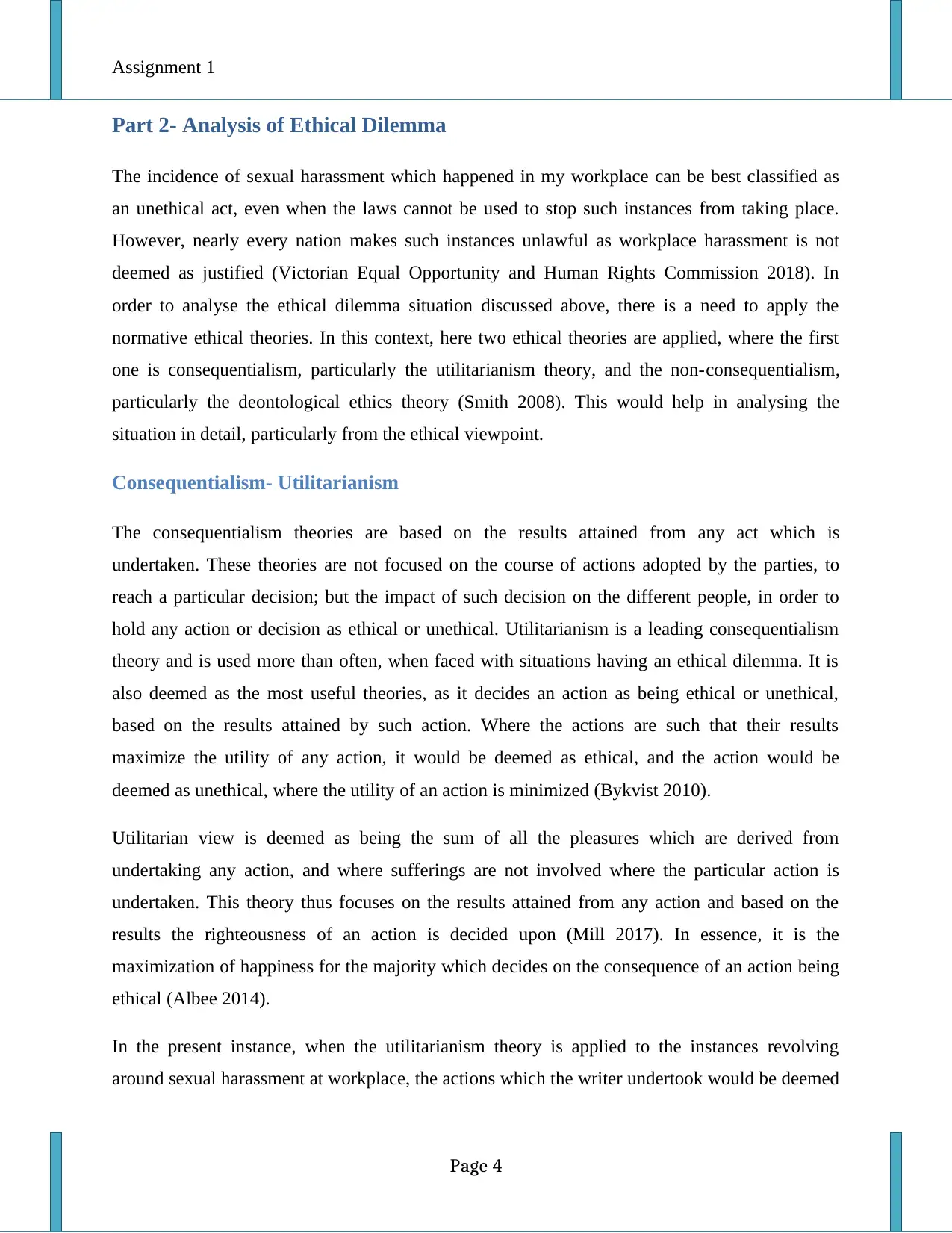
Assignment 1
Part 2- Analysis of Ethical Dilemma
The incidence of sexual harassment which happened in my workplace can be best classified as
an unethical act, even when the laws cannot be used to stop such instances from taking place.
However, nearly every nation makes such instances unlawful as workplace harassment is not
deemed as justified (Victorian Equal Opportunity and Human Rights Commission 2018). In
order to analyse the ethical dilemma situation discussed above, there is a need to apply the
normative ethical theories. In this context, here two ethical theories are applied, where the first
one is consequentialism, particularly the utilitarianism theory, and the non-consequentialism,
particularly the deontological ethics theory (Smith 2008). This would help in analysing the
situation in detail, particularly from the ethical viewpoint.
Consequentialism- Utilitarianism
The consequentialism theories are based on the results attained from any act which is
undertaken. These theories are not focused on the course of actions adopted by the parties, to
reach a particular decision; but the impact of such decision on the different people, in order to
hold any action or decision as ethical or unethical. Utilitarianism is a leading consequentialism
theory and is used more than often, when faced with situations having an ethical dilemma. It is
also deemed as the most useful theories, as it decides an action as being ethical or unethical,
based on the results attained by such action. Where the actions are such that their results
maximize the utility of any action, it would be deemed as ethical, and the action would be
deemed as unethical, where the utility of an action is minimized (Bykvist 2010).
Utilitarian view is deemed as being the sum of all the pleasures which are derived from
undertaking any action, and where sufferings are not involved where the particular action is
undertaken. This theory thus focuses on the results attained from any action and based on the
results the righteousness of an action is decided upon (Mill 2017). In essence, it is the
maximization of happiness for the majority which decides on the consequence of an action being
ethical (Albee 2014).
In the present instance, when the utilitarianism theory is applied to the instances revolving
around sexual harassment at workplace, the actions which the writer undertook would be deemed
Page 4
Part 2- Analysis of Ethical Dilemma
The incidence of sexual harassment which happened in my workplace can be best classified as
an unethical act, even when the laws cannot be used to stop such instances from taking place.
However, nearly every nation makes such instances unlawful as workplace harassment is not
deemed as justified (Victorian Equal Opportunity and Human Rights Commission 2018). In
order to analyse the ethical dilemma situation discussed above, there is a need to apply the
normative ethical theories. In this context, here two ethical theories are applied, where the first
one is consequentialism, particularly the utilitarianism theory, and the non-consequentialism,
particularly the deontological ethics theory (Smith 2008). This would help in analysing the
situation in detail, particularly from the ethical viewpoint.
Consequentialism- Utilitarianism
The consequentialism theories are based on the results attained from any act which is
undertaken. These theories are not focused on the course of actions adopted by the parties, to
reach a particular decision; but the impact of such decision on the different people, in order to
hold any action or decision as ethical or unethical. Utilitarianism is a leading consequentialism
theory and is used more than often, when faced with situations having an ethical dilemma. It is
also deemed as the most useful theories, as it decides an action as being ethical or unethical,
based on the results attained by such action. Where the actions are such that their results
maximize the utility of any action, it would be deemed as ethical, and the action would be
deemed as unethical, where the utility of an action is minimized (Bykvist 2010).
Utilitarian view is deemed as being the sum of all the pleasures which are derived from
undertaking any action, and where sufferings are not involved where the particular action is
undertaken. This theory thus focuses on the results attained from any action and based on the
results the righteousness of an action is decided upon (Mill 2017). In essence, it is the
maximization of happiness for the majority which decides on the consequence of an action being
ethical (Albee 2014).
In the present instance, when the utilitarianism theory is applied to the instances revolving
around sexual harassment at workplace, the actions which the writer undertook would be deemed
Page 4
Paraphrase This Document
Need a fresh take? Get an instant paraphrase of this document with our AI Paraphraser
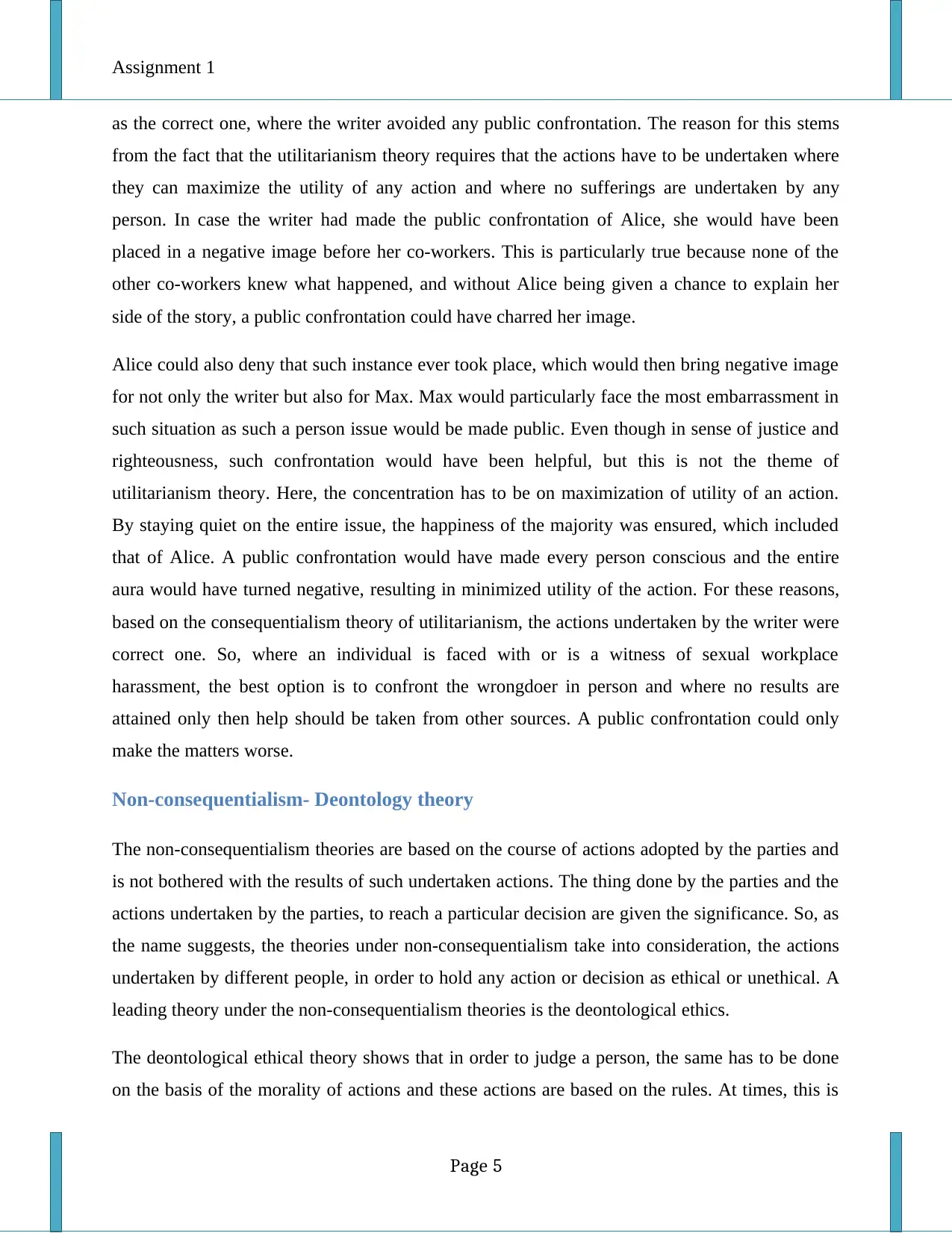
Assignment 1
as the correct one, where the writer avoided any public confrontation. The reason for this stems
from the fact that the utilitarianism theory requires that the actions have to be undertaken where
they can maximize the utility of any action and where no sufferings are undertaken by any
person. In case the writer had made the public confrontation of Alice, she would have been
placed in a negative image before her co-workers. This is particularly true because none of the
other co-workers knew what happened, and without Alice being given a chance to explain her
side of the story, a public confrontation could have charred her image.
Alice could also deny that such instance ever took place, which would then bring negative image
for not only the writer but also for Max. Max would particularly face the most embarrassment in
such situation as such a person issue would be made public. Even though in sense of justice and
righteousness, such confrontation would have been helpful, but this is not the theme of
utilitarianism theory. Here, the concentration has to be on maximization of utility of an action.
By staying quiet on the entire issue, the happiness of the majority was ensured, which included
that of Alice. A public confrontation would have made every person conscious and the entire
aura would have turned negative, resulting in minimized utility of the action. For these reasons,
based on the consequentialism theory of utilitarianism, the actions undertaken by the writer were
correct one. So, where an individual is faced with or is a witness of sexual workplace
harassment, the best option is to confront the wrongdoer in person and where no results are
attained only then help should be taken from other sources. A public confrontation could only
make the matters worse.
Non-consequentialism- Deontology theory
The non-consequentialism theories are based on the course of actions adopted by the parties and
is not bothered with the results of such undertaken actions. The thing done by the parties and the
actions undertaken by the parties, to reach a particular decision are given the significance. So, as
the name suggests, the theories under non-consequentialism take into consideration, the actions
undertaken by different people, in order to hold any action or decision as ethical or unethical. A
leading theory under the non-consequentialism theories is the deontological ethics.
The deontological ethical theory shows that in order to judge a person, the same has to be done
on the basis of the morality of actions and these actions are based on the rules. At times, this is
Page 5
as the correct one, where the writer avoided any public confrontation. The reason for this stems
from the fact that the utilitarianism theory requires that the actions have to be undertaken where
they can maximize the utility of any action and where no sufferings are undertaken by any
person. In case the writer had made the public confrontation of Alice, she would have been
placed in a negative image before her co-workers. This is particularly true because none of the
other co-workers knew what happened, and without Alice being given a chance to explain her
side of the story, a public confrontation could have charred her image.
Alice could also deny that such instance ever took place, which would then bring negative image
for not only the writer but also for Max. Max would particularly face the most embarrassment in
such situation as such a person issue would be made public. Even though in sense of justice and
righteousness, such confrontation would have been helpful, but this is not the theme of
utilitarianism theory. Here, the concentration has to be on maximization of utility of an action.
By staying quiet on the entire issue, the happiness of the majority was ensured, which included
that of Alice. A public confrontation would have made every person conscious and the entire
aura would have turned negative, resulting in minimized utility of the action. For these reasons,
based on the consequentialism theory of utilitarianism, the actions undertaken by the writer were
correct one. So, where an individual is faced with or is a witness of sexual workplace
harassment, the best option is to confront the wrongdoer in person and where no results are
attained only then help should be taken from other sources. A public confrontation could only
make the matters worse.
Non-consequentialism- Deontology theory
The non-consequentialism theories are based on the course of actions adopted by the parties and
is not bothered with the results of such undertaken actions. The thing done by the parties and the
actions undertaken by the parties, to reach a particular decision are given the significance. So, as
the name suggests, the theories under non-consequentialism take into consideration, the actions
undertaken by different people, in order to hold any action or decision as ethical or unethical. A
leading theory under the non-consequentialism theories is the deontological ethics.
The deontological ethical theory shows that in order to judge a person, the same has to be done
on the basis of the morality of actions and these actions are based on the rules. At times, this is
Page 5
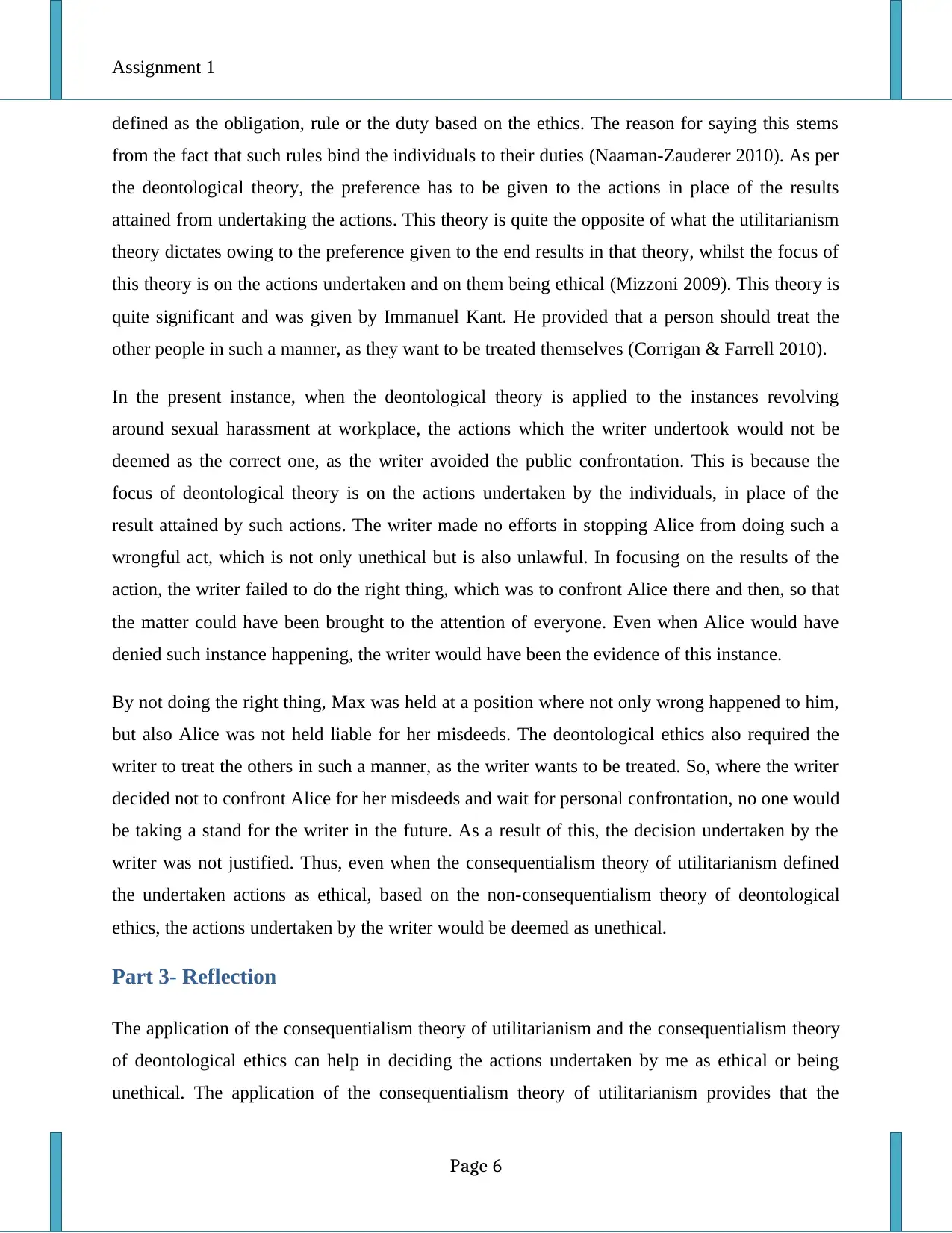
Assignment 1
defined as the obligation, rule or the duty based on the ethics. The reason for saying this stems
from the fact that such rules bind the individuals to their duties (Naaman-Zauderer 2010). As per
the deontological theory, the preference has to be given to the actions in place of the results
attained from undertaking the actions. This theory is quite the opposite of what the utilitarianism
theory dictates owing to the preference given to the end results in that theory, whilst the focus of
this theory is on the actions undertaken and on them being ethical (Mizzoni 2009). This theory is
quite significant and was given by Immanuel Kant. He provided that a person should treat the
other people in such a manner, as they want to be treated themselves (Corrigan & Farrell 2010).
In the present instance, when the deontological theory is applied to the instances revolving
around sexual harassment at workplace, the actions which the writer undertook would not be
deemed as the correct one, as the writer avoided the public confrontation. This is because the
focus of deontological theory is on the actions undertaken by the individuals, in place of the
result attained by such actions. The writer made no efforts in stopping Alice from doing such a
wrongful act, which is not only unethical but is also unlawful. In focusing on the results of the
action, the writer failed to do the right thing, which was to confront Alice there and then, so that
the matter could have been brought to the attention of everyone. Even when Alice would have
denied such instance happening, the writer would have been the evidence of this instance.
By not doing the right thing, Max was held at a position where not only wrong happened to him,
but also Alice was not held liable for her misdeeds. The deontological ethics also required the
writer to treat the others in such a manner, as the writer wants to be treated. So, where the writer
decided not to confront Alice for her misdeeds and wait for personal confrontation, no one would
be taking a stand for the writer in the future. As a result of this, the decision undertaken by the
writer was not justified. Thus, even when the consequentialism theory of utilitarianism defined
the undertaken actions as ethical, based on the non-consequentialism theory of deontological
ethics, the actions undertaken by the writer would be deemed as unethical.
Part 3- Reflection
The application of the consequentialism theory of utilitarianism and the consequentialism theory
of deontological ethics can help in deciding the actions undertaken by me as ethical or being
unethical. The application of the consequentialism theory of utilitarianism provides that the
Page 6
defined as the obligation, rule or the duty based on the ethics. The reason for saying this stems
from the fact that such rules bind the individuals to their duties (Naaman-Zauderer 2010). As per
the deontological theory, the preference has to be given to the actions in place of the results
attained from undertaking the actions. This theory is quite the opposite of what the utilitarianism
theory dictates owing to the preference given to the end results in that theory, whilst the focus of
this theory is on the actions undertaken and on them being ethical (Mizzoni 2009). This theory is
quite significant and was given by Immanuel Kant. He provided that a person should treat the
other people in such a manner, as they want to be treated themselves (Corrigan & Farrell 2010).
In the present instance, when the deontological theory is applied to the instances revolving
around sexual harassment at workplace, the actions which the writer undertook would not be
deemed as the correct one, as the writer avoided the public confrontation. This is because the
focus of deontological theory is on the actions undertaken by the individuals, in place of the
result attained by such actions. The writer made no efforts in stopping Alice from doing such a
wrongful act, which is not only unethical but is also unlawful. In focusing on the results of the
action, the writer failed to do the right thing, which was to confront Alice there and then, so that
the matter could have been brought to the attention of everyone. Even when Alice would have
denied such instance happening, the writer would have been the evidence of this instance.
By not doing the right thing, Max was held at a position where not only wrong happened to him,
but also Alice was not held liable for her misdeeds. The deontological ethics also required the
writer to treat the others in such a manner, as the writer wants to be treated. So, where the writer
decided not to confront Alice for her misdeeds and wait for personal confrontation, no one would
be taking a stand for the writer in the future. As a result of this, the decision undertaken by the
writer was not justified. Thus, even when the consequentialism theory of utilitarianism defined
the undertaken actions as ethical, based on the non-consequentialism theory of deontological
ethics, the actions undertaken by the writer would be deemed as unethical.
Part 3- Reflection
The application of the consequentialism theory of utilitarianism and the consequentialism theory
of deontological ethics can help in deciding the actions undertaken by me as ethical or being
unethical. The application of the consequentialism theory of utilitarianism provides that the
Page 6
⊘ This is a preview!⊘
Do you want full access?
Subscribe today to unlock all pages.

Trusted by 1+ million students worldwide
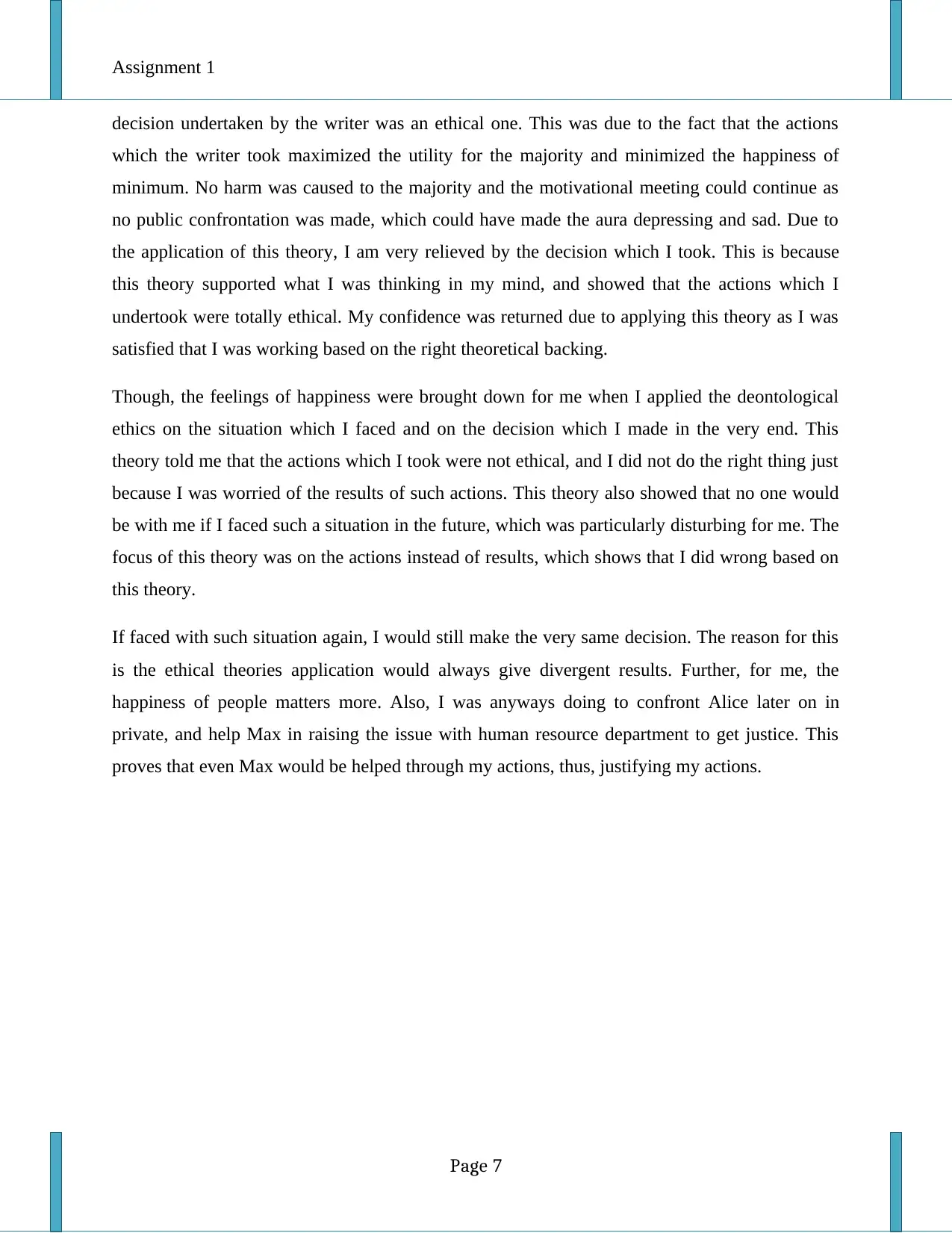
Assignment 1
decision undertaken by the writer was an ethical one. This was due to the fact that the actions
which the writer took maximized the utility for the majority and minimized the happiness of
minimum. No harm was caused to the majority and the motivational meeting could continue as
no public confrontation was made, which could have made the aura depressing and sad. Due to
the application of this theory, I am very relieved by the decision which I took. This is because
this theory supported what I was thinking in my mind, and showed that the actions which I
undertook were totally ethical. My confidence was returned due to applying this theory as I was
satisfied that I was working based on the right theoretical backing.
Though, the feelings of happiness were brought down for me when I applied the deontological
ethics on the situation which I faced and on the decision which I made in the very end. This
theory told me that the actions which I took were not ethical, and I did not do the right thing just
because I was worried of the results of such actions. This theory also showed that no one would
be with me if I faced such a situation in the future, which was particularly disturbing for me. The
focus of this theory was on the actions instead of results, which shows that I did wrong based on
this theory.
If faced with such situation again, I would still make the very same decision. The reason for this
is the ethical theories application would always give divergent results. Further, for me, the
happiness of people matters more. Also, I was anyways doing to confront Alice later on in
private, and help Max in raising the issue with human resource department to get justice. This
proves that even Max would be helped through my actions, thus, justifying my actions.
Page 7
decision undertaken by the writer was an ethical one. This was due to the fact that the actions
which the writer took maximized the utility for the majority and minimized the happiness of
minimum. No harm was caused to the majority and the motivational meeting could continue as
no public confrontation was made, which could have made the aura depressing and sad. Due to
the application of this theory, I am very relieved by the decision which I took. This is because
this theory supported what I was thinking in my mind, and showed that the actions which I
undertook were totally ethical. My confidence was returned due to applying this theory as I was
satisfied that I was working based on the right theoretical backing.
Though, the feelings of happiness were brought down for me when I applied the deontological
ethics on the situation which I faced and on the decision which I made in the very end. This
theory told me that the actions which I took were not ethical, and I did not do the right thing just
because I was worried of the results of such actions. This theory also showed that no one would
be with me if I faced such a situation in the future, which was particularly disturbing for me. The
focus of this theory was on the actions instead of results, which shows that I did wrong based on
this theory.
If faced with such situation again, I would still make the very same decision. The reason for this
is the ethical theories application would always give divergent results. Further, for me, the
happiness of people matters more. Also, I was anyways doing to confront Alice later on in
private, and help Max in raising the issue with human resource department to get justice. This
proves that even Max would be helped through my actions, thus, justifying my actions.
Page 7
Paraphrase This Document
Need a fresh take? Get an instant paraphrase of this document with our AI Paraphraser
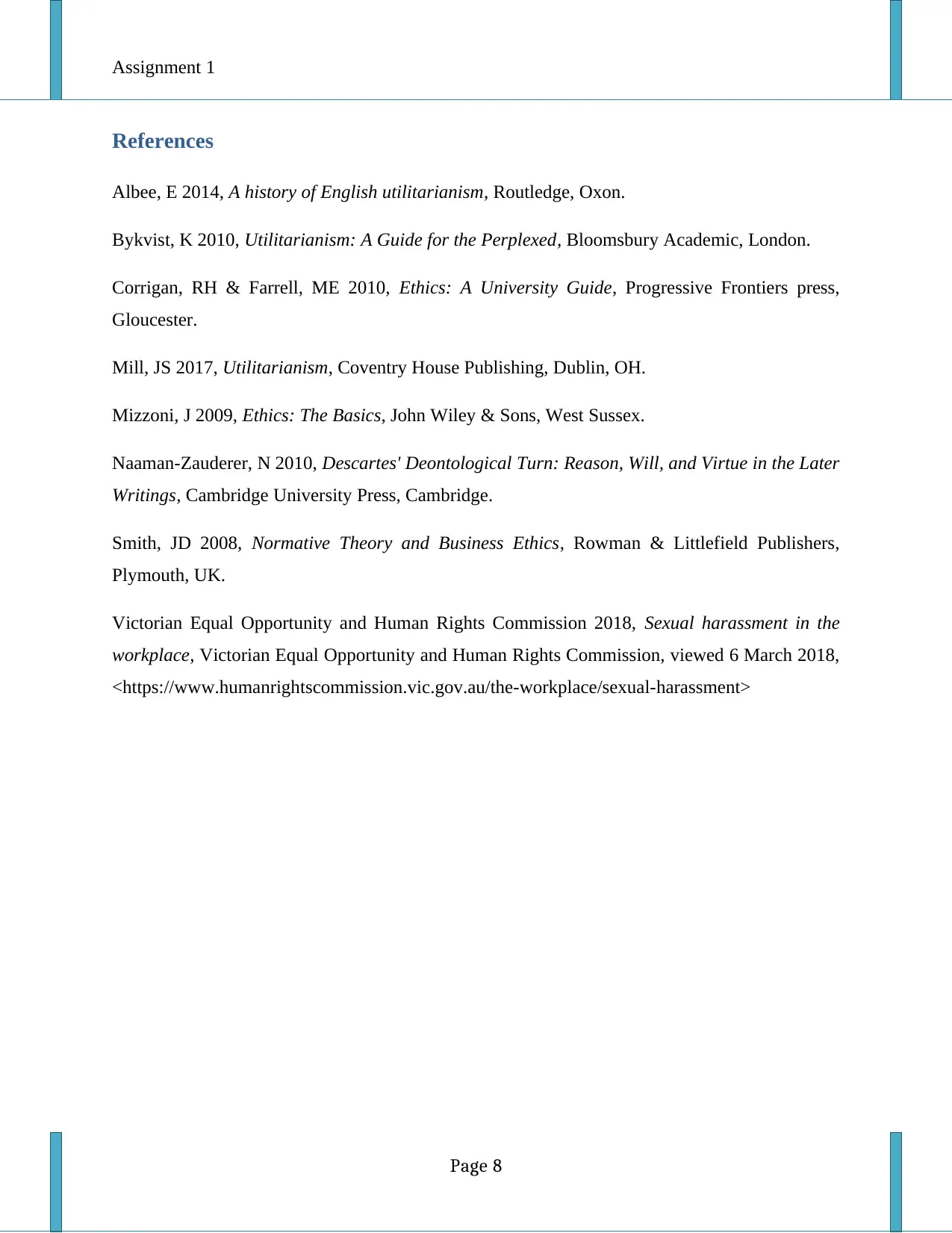
Assignment 1
References
Albee, E 2014, A history of English utilitarianism, Routledge, Oxon.
Bykvist, K 2010, Utilitarianism: A Guide for the Perplexed, Bloomsbury Academic, London.
Corrigan, RH & Farrell, ME 2010, Ethics: A University Guide, Progressive Frontiers press,
Gloucester.
Mill, JS 2017, Utilitarianism, Coventry House Publishing, Dublin, OH.
Mizzoni, J 2009, Ethics: The Basics, John Wiley & Sons, West Sussex.
Naaman-Zauderer, N 2010, Descartes' Deontological Turn: Reason, Will, and Virtue in the Later
Writings, Cambridge University Press, Cambridge.
Smith, JD 2008, Normative Theory and Business Ethics, Rowman & Littlefield Publishers,
Plymouth, UK.
Victorian Equal Opportunity and Human Rights Commission 2018, Sexual harassment in the
workplace, Victorian Equal Opportunity and Human Rights Commission, viewed 6 March 2018,
<https://www.humanrightscommission.vic.gov.au/the-workplace/sexual-harassment>
Page 8
References
Albee, E 2014, A history of English utilitarianism, Routledge, Oxon.
Bykvist, K 2010, Utilitarianism: A Guide for the Perplexed, Bloomsbury Academic, London.
Corrigan, RH & Farrell, ME 2010, Ethics: A University Guide, Progressive Frontiers press,
Gloucester.
Mill, JS 2017, Utilitarianism, Coventry House Publishing, Dublin, OH.
Mizzoni, J 2009, Ethics: The Basics, John Wiley & Sons, West Sussex.
Naaman-Zauderer, N 2010, Descartes' Deontological Turn: Reason, Will, and Virtue in the Later
Writings, Cambridge University Press, Cambridge.
Smith, JD 2008, Normative Theory and Business Ethics, Rowman & Littlefield Publishers,
Plymouth, UK.
Victorian Equal Opportunity and Human Rights Commission 2018, Sexual harassment in the
workplace, Victorian Equal Opportunity and Human Rights Commission, viewed 6 March 2018,
<https://www.humanrightscommission.vic.gov.au/the-workplace/sexual-harassment>
Page 8
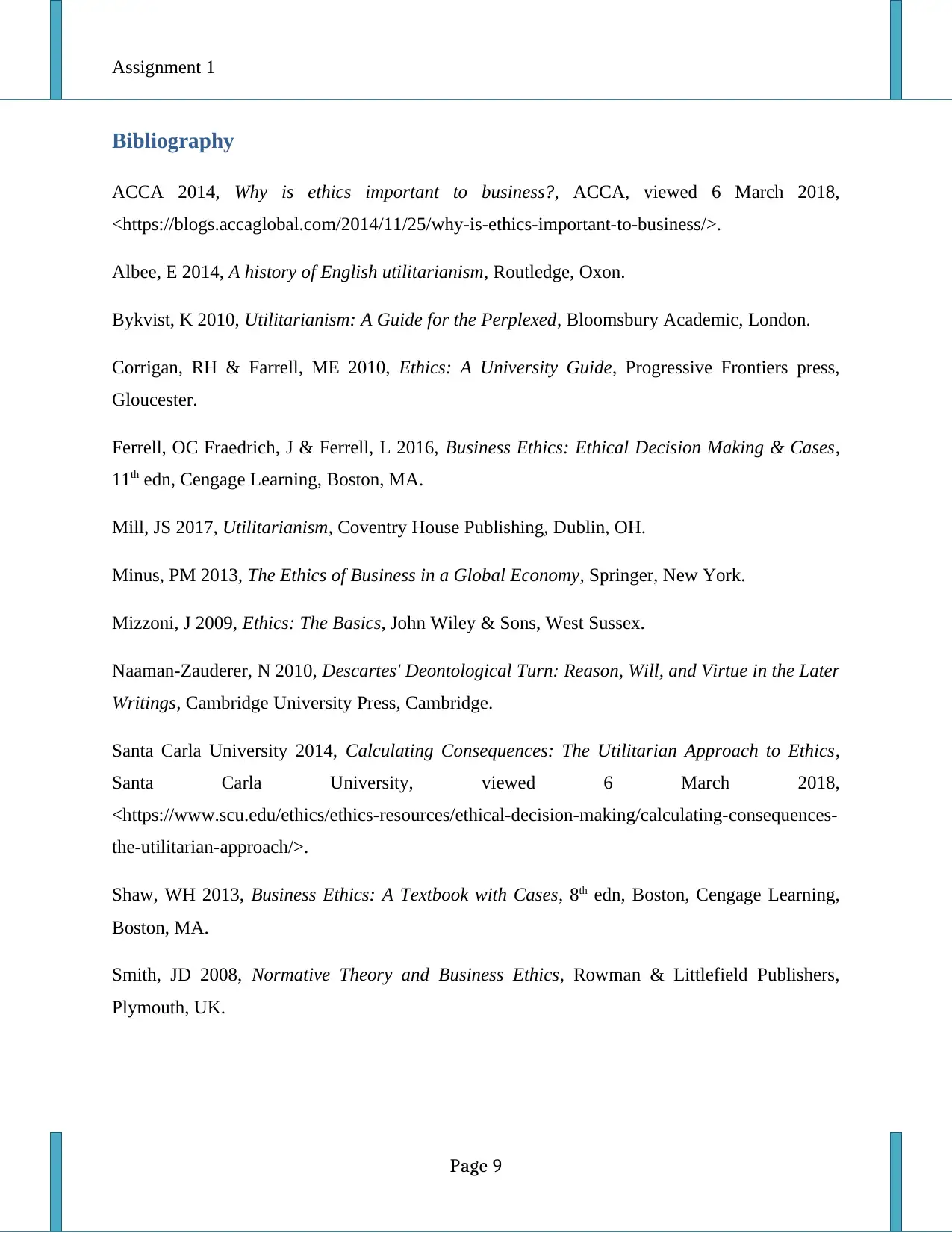
Assignment 1
Bibliography
ACCA 2014, Why is ethics important to business?, ACCA, viewed 6 March 2018,
<https://blogs.accaglobal.com/2014/11/25/why-is-ethics-important-to-business/>.
Albee, E 2014, A history of English utilitarianism, Routledge, Oxon.
Bykvist, K 2010, Utilitarianism: A Guide for the Perplexed, Bloomsbury Academic, London.
Corrigan, RH & Farrell, ME 2010, Ethics: A University Guide, Progressive Frontiers press,
Gloucester.
Ferrell, OC Fraedrich, J & Ferrell, L 2016, Business Ethics: Ethical Decision Making & Cases,
11th edn, Cengage Learning, Boston, MA.
Mill, JS 2017, Utilitarianism, Coventry House Publishing, Dublin, OH.
Minus, PM 2013, The Ethics of Business in a Global Economy, Springer, New York.
Mizzoni, J 2009, Ethics: The Basics, John Wiley & Sons, West Sussex.
Naaman-Zauderer, N 2010, Descartes' Deontological Turn: Reason, Will, and Virtue in the Later
Writings, Cambridge University Press, Cambridge.
Santa Carla University 2014, Calculating Consequences: The Utilitarian Approach to Ethics,
Santa Carla University, viewed 6 March 2018,
<https://www.scu.edu/ethics/ethics-resources/ethical-decision-making/calculating-consequences-
the-utilitarian-approach/>.
Shaw, WH 2013, Business Ethics: A Textbook with Cases, 8th edn, Boston, Cengage Learning,
Boston, MA.
Smith, JD 2008, Normative Theory and Business Ethics, Rowman & Littlefield Publishers,
Plymouth, UK.
Page 9
Bibliography
ACCA 2014, Why is ethics important to business?, ACCA, viewed 6 March 2018,
<https://blogs.accaglobal.com/2014/11/25/why-is-ethics-important-to-business/>.
Albee, E 2014, A history of English utilitarianism, Routledge, Oxon.
Bykvist, K 2010, Utilitarianism: A Guide for the Perplexed, Bloomsbury Academic, London.
Corrigan, RH & Farrell, ME 2010, Ethics: A University Guide, Progressive Frontiers press,
Gloucester.
Ferrell, OC Fraedrich, J & Ferrell, L 2016, Business Ethics: Ethical Decision Making & Cases,
11th edn, Cengage Learning, Boston, MA.
Mill, JS 2017, Utilitarianism, Coventry House Publishing, Dublin, OH.
Minus, PM 2013, The Ethics of Business in a Global Economy, Springer, New York.
Mizzoni, J 2009, Ethics: The Basics, John Wiley & Sons, West Sussex.
Naaman-Zauderer, N 2010, Descartes' Deontological Turn: Reason, Will, and Virtue in the Later
Writings, Cambridge University Press, Cambridge.
Santa Carla University 2014, Calculating Consequences: The Utilitarian Approach to Ethics,
Santa Carla University, viewed 6 March 2018,
<https://www.scu.edu/ethics/ethics-resources/ethical-decision-making/calculating-consequences-
the-utilitarian-approach/>.
Shaw, WH 2013, Business Ethics: A Textbook with Cases, 8th edn, Boston, Cengage Learning,
Boston, MA.
Smith, JD 2008, Normative Theory and Business Ethics, Rowman & Littlefield Publishers,
Plymouth, UK.
Page 9
⊘ This is a preview!⊘
Do you want full access?
Subscribe today to unlock all pages.

Trusted by 1+ million students worldwide
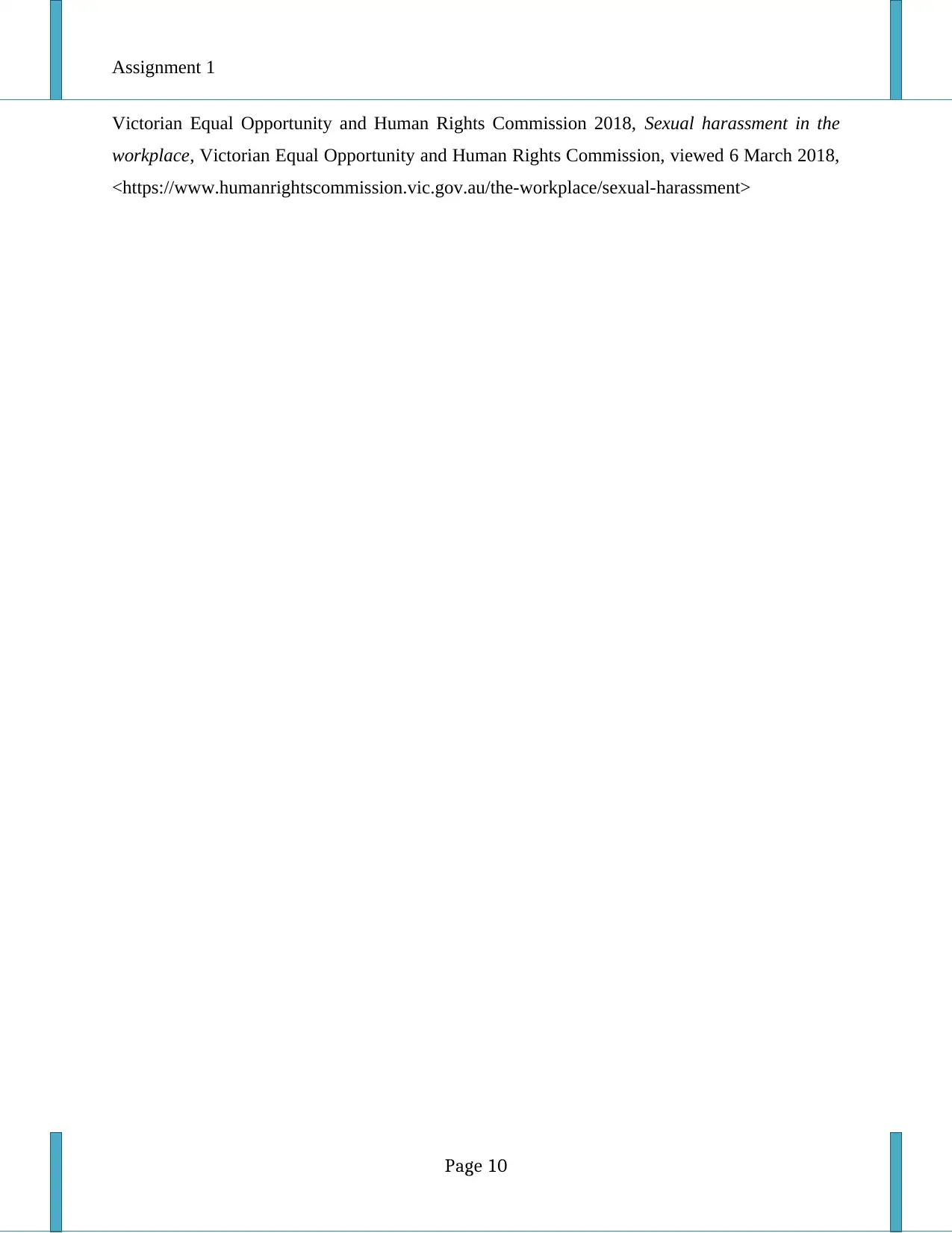
Assignment 1
Victorian Equal Opportunity and Human Rights Commission 2018, Sexual harassment in the
workplace, Victorian Equal Opportunity and Human Rights Commission, viewed 6 March 2018,
<https://www.humanrightscommission.vic.gov.au/the-workplace/sexual-harassment>
Page 10
Victorian Equal Opportunity and Human Rights Commission 2018, Sexual harassment in the
workplace, Victorian Equal Opportunity and Human Rights Commission, viewed 6 March 2018,
<https://www.humanrightscommission.vic.gov.au/the-workplace/sexual-harassment>
Page 10
1 out of 10
Your All-in-One AI-Powered Toolkit for Academic Success.
+13062052269
info@desklib.com
Available 24*7 on WhatsApp / Email
![[object Object]](/_next/static/media/star-bottom.7253800d.svg)
Unlock your academic potential
Copyright © 2020–2026 A2Z Services. All Rights Reserved. Developed and managed by ZUCOL.
